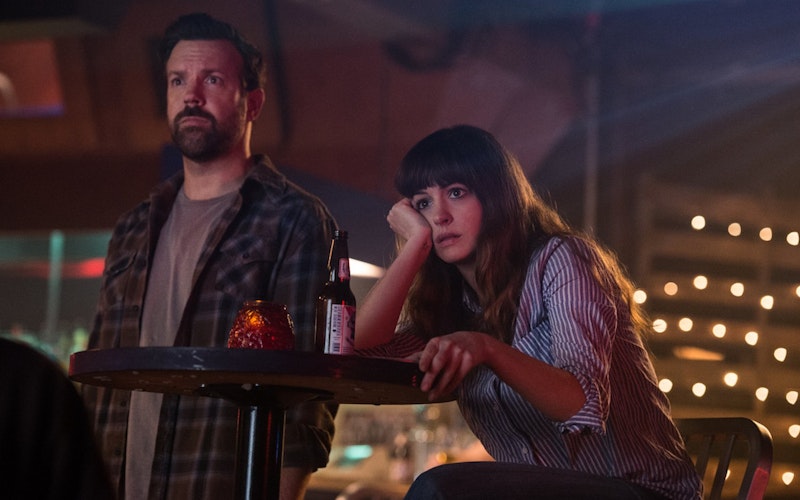
Movies
Colossal and Taming Our Inner Monsters
The dark science-fiction comedy Colossal, now available on DVD, offers an unconventional riff on the classic monster movie. It’s worth seeing on that score alone, but what makes it especially compelling is its canny allegory of personal responsibility. For all its outlandish quirks, this bizarre creature feature channels a surprisingly biblical message about waging war with the monsters inside of us.
Anne Hathaway stars as Gloria, an unemployed writer and alcoholic party girl forced to return to her hometown in middle America after being dumped by her boyfriend and kicked out of their New York apartment. Back home, she reunites with a childhood friend, Oscar (Jason Sudeikis), who cheerfully lends her some furniture and offers her a job at the local bar he manages. Things seem to be going well for Gloria until this arrangement devolves into a nightly ritual of binge drinking with Oscar and his buddies. Once personal secrets are revealed and childhood jealousies become inflamed, things quickly spin out of control.
Meanwhile—and this is quite a meanwhile, which will involve some spoilers—a giant kaiju begins wreaking havoc in Seoul. Gloria soon discovers a mysterious connection between her and the creature. Horrified to find that her drunken antics are inadvertently responsible for massive casualties half a world away, she desperately attempts to contain the situation by quitting the booze and avoiding the park where she’s able to make the monster manifest. She even compels her beastly counterpart to carefully scribble a note of apology in the ground. But when a second monster emerges over Seoul to provoke the first, an epic battle seems inevitable—both overseas and at home.
In the process of all this strangeness, Colossal becomes a peculiarly apt metaphor for spiritual character development. Gloria’s rampaging kaiju is, of course, a thinly veiled metaphor for her out-of-control lifestyle. In lesser hands, such overt symbolism might seem trite and unconvincing, but Hathaway and director Nacho Vigalondo offer a sympathetic treatment of Gloria's alcoholism, one that is as credible as it is audacious. Viewers who have struggled with this or another besetting sin will have no trouble appreciating why her personal demons could seem every bit as intimidating—and destructive—as a 10-story monster.
Once Gloria acknowledges her connection to the creature, she gains power over its calamitous potential.
In one of my favorite scenes, we watch as Gloria tests her suspicion about the monster’s true identity. After gingerly stepping onto the playground at the park, she first holds her left hand high above her head, then extends both arms out wide. Running home, she reluctantly turns on the television and watches in transfixed dread as the latest footage from Seoul reveals the monster perfectly imitating her hand gestures. In a brilliant flourish, the camera offers us a silhouetted view of Gloria from behind as the creature spreads its arms on the TV screen in front of her. In that moment, we see Gloria and the monster as one.
What makes Gloria a compelling protagonist, though, is her willingness to accept responsibility for this monstrous identity and to seek a way to make things right. In that regard, her response to the death and destruction in Seoul mirrors a Christian response to the convicting work of the Holy Spirit: authentic contrition, followed by honest confession and earnest repentance. Gloria can’t wish the monster away or undo its collateral damage, but once she acknowledges her connection to the creature, she gains power over its calamitous potential. And that enables her to confidently engage the film's intractable second monster—another thinly veiled metaphor that, in a sense, represents the tempter’s jealous resolve to destroy sinners.
The Bible says that when we admit our own powerlessness over our inner monsters, Jesus himself comes to dwell in our hearts, displacing sin’s tyrannical authority with the same power that triumphed over the grave. “I have been crucified with Christ,” Paul writes, “and I no longer live, but Christ lives in me.” Though the sin nature remains, its power over us is broken, and we discover that we can confidently wage war against the spiritual forces of darkness. We can do so because, as John so eloquently puts it, “The one who is in you is greater than the one who is in the world.”
We catch an oddly satisfying glimpse of what that “greater power” might look like during Colossal's dramatic final confrontation, which I won’t detail. At the same time, the most notable thing about the film’s ending is its understated note of uncertainty. In one sense, Gloria’s battle is over. In another sense, it has only just begun.
For Christians, too, the struggle with sin is never over, at least not on this side of glory. Fortunately, it's a battle we don't have to face on our own, and the outcome is already settled—for eternity.
Topics: Movies, Culture At Large, Arts & Leisure